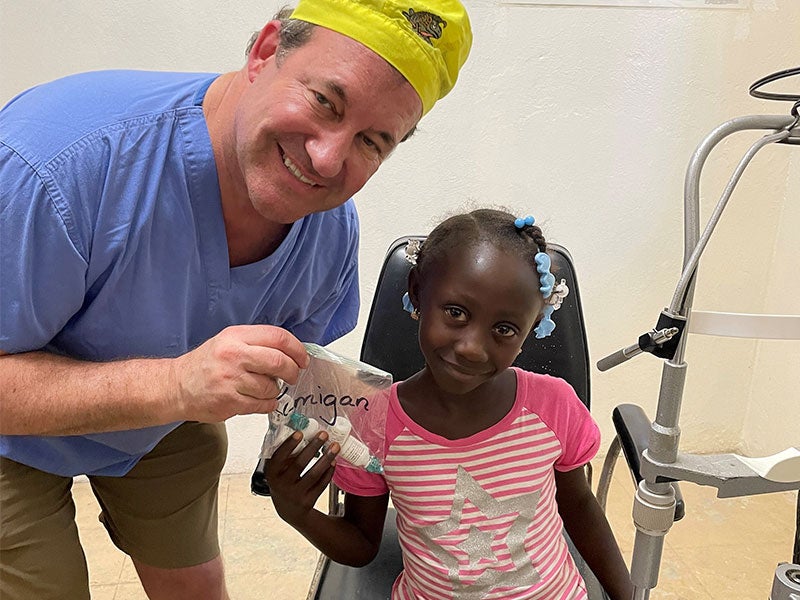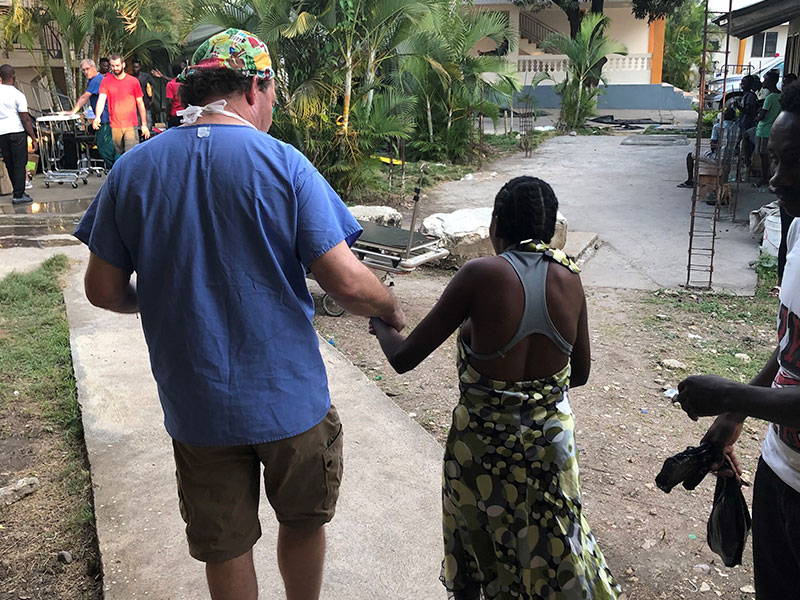The Gift of Sight
Ophthalmologist Lance Bergstrom ’86 of Fargo, N.D., chose his field in part because eye surgeries have a huge impact on a patient’s quality of life. “I also was cognizant of the fact that it’s a great specialty for mission work,” he says. “I had it in the back of my mind that that’s what I wanted to do.”

In 2022, Lance Bergstrom '86 diagnosed an eight-year-old with glaucoma. The year’s supply of eye drops she received kept her vision stable until the team returned last February with another year’s supply.
He took part in mission trips to Borneo and Kenya, and he worked with the Himalayan Cataract Project. But with limited time and budget, he thought it made more sense to serve people a short plane ride away, with incredible need. His first trip to Haiti was in 2012, and Haiti Eye Mission was incorporated as a nonprofit in 2017.
Haiti is the poorest country in the Western hemisphere. Eye problems are at epidemic levels there—Bergstrom estimates 20 percent of Haitians have glaucoma (globally, it’s close to 2 percent). Poor nutrition and intense sun produce severe cataracts. And access to eye care is abysmally low. Bergstrom’s team is the only one to serve the Pignon area of 250,000 people. During their annual visits, the Haiti Eye Mission treats 1,500 patients and performs over 330 surgeries. In addition to surgeries, they screen patients, provide glasses, and distribute eye drops to prevent worsening glaucoma. The mission’s long-term goal is to secure sustainable eye care in the region through trained Haitian doctors.
Luckily, cataract surgery is straightforward and sutureless. “On a good day, we can do 40 or more of these surgeries in a MASH tent with only generators and rechargeable batteries for power,” Bergstrom says. “The outcomes rival first-world surgery.” In many cases, people who have been legally blind for 15 or 20 years have their vision restored overnight.

Lance Bergstrom '86 accompanies a patient who, just the day before, had been blind in both eyes from cataracts.
With a per capita income in Pignon of a few hundred dollars per year, even a $3 motorcycle taxi to the clinic can be prohibitive, so people sometimes walk more than a day to be seen. If they can’t be seen when they arrive, they sleep on the ground outside the clinic overnight. This is their one opportunity for an entire year to receive treatment that may save or restore their sight.
Beyond sight, lives and livelihoods hang in the balance. Given the country’s poor resources, education isn’t readily available to blind children. And rather than earning a living, caretakers often have to stay home with blind family members. For these families, restoring vision and preventing blindness have profound trickle-down effects.
Kristin Follman, executive director of the mission, says, “Dr. Bergstrom has a servant’s heart, plain and simple.” She recalls a blind woman in her 20s showing up hours before the team’s departure. Bergstrom refused to leave her blind for another year. They quickly sanitized the OR, found supplies in the already packed boxes, and started her surgery 45 minutes before their scheduled departure. The woman’s sight was restored.
“The average lifespan of a person who is blind in a third-world country is less than five years,” Bergstrom says, “so not only does this give them their sight back, but it gives them their lives back.”
Learn more about Haiti Eye Mission at haitieyemission.com.